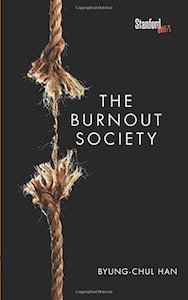
Byung-Chul Han’s The Burnout Society is a collection of essays reviewing famous thinkers’ (Deleuze, Freud, Arendt, Ehrenberg, et alia) thinking about the ailments of society in an attempt to diagnose what ails now. Each essay builds towards an argument with a number of subtle nuances. At only 72 pages, this is the perfect book-club book as I am sure it would provoke much discussion despite the linguistic armour that so much German philosophy enshrouds its critical ideas in (an armour that I cannot claim to have pierced, but I still found this book to be very thought-provoking).
The argument centers around Han’s concept of the individual as a “late-modern achievement-subject” that is:
- self-deluded into thinking just because they are not dominated by a person or by duty, they are free;
- the highest expression of freedom is to produce which is exactly what the capitalist system wants,
- therefore people are self-exploiting themselves and thus burning out.
It is a damnation of the hyper-individualization/atomization of society. Some key quotes:
Auto-exploitation is more efficient than allo-exploitation because a deceptive feeling of freedom accompanies it.
The capitalist system is switching from allo-exploitation to auto-exploitation in order to accelerate.
and some zingers:
The attitude toward time and environment known as “multitasking” does not represent civilizational progress.
In social networks, the function of “friends” is primarily to heighten narcissism by granting attention, as consumers, to the ego exhibited as a commodity.
(ahem, follow me on Twitter…)
Most of the book serves to contextualize the factors that lead to such an ill society.
Why I liked this book
Even though this book can be glibly summed up as “late-stage capitalism is bad,” I found the discussion valuable, especially Han’s arguments for boredom and the vita contempliva. His whole discussion about humans being reduced to animal laborans and feeling that they need to “Just do something… anything!” hits me as I come out of a meditation retreat where we were encouraged to “do nothing … really good.” In fact, my years of “mastering” information overload, of being an “efficient” consumer (eg. listening to audiobooks/podcasts while doing other tasks), is a good example of the symptoms that ail burnout society. It is “deadly hyperactivity” as Han puts it. He reminds us that:
We owe the cultural achievements of humanity—which include philosophy—to deep, contemplative attention.
and:
… deep boredom is the peak of mental relaxation. A purely hectic rush produces nothing new. It reproduces and accelerates what is already available.
Furthermore, it does not lead to a good life. He uses an Aristotle quote to remind us that the capitalist society is not concerned with the Good Life, that it “absolutes survival” turning you into an animalistic machine, scratching out a mere existence of socially prescriptive productivity. Putting it bluntly he states:
In this society of compulsion, everyone carries a work camp inside.
Well, I am off to meditate and try and turn that “work camp” into a garden of happiness.

